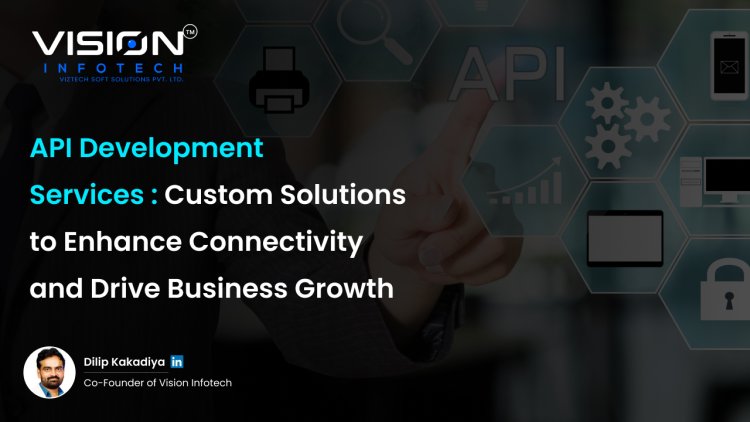Unlocking Business Efficiency with API Integration Services and Development
Unlocking Business Efficiency with API Integration Services and Development
Share this Post to earn Money ( Upto ₹100 per 1000 Views )

Introduction
In today’s fast-paced digital world, businesses thrive on seamless connectivity and data exchange. Application Programming Interface (API) integration services have become a key enabler of this transformation. Whether it's automating processes, improving customer experiences, or creating custom digital ecosystems, API integration services and development play a critical role in driving efficiency and growth. This blog explores the core concepts behind API integration services and development, their benefits, challenges, and best practices for businesses looking to harness their full potential.
What is API Integration?
API integration allows different software systems to communicate with each other, enabling them to share data and execute functions without manual intervention. In simpler terms, APIs are intermediaries that let applications "talk" to each other, exchanging information in real-time or on demand.
For example, when you book a flight on a travel website, multiple APIs work behind the scenes to check availability, process payments, and send booking confirmations—connecting airlines, banks, and notification services.
Key Types of API Integration Services
-
Custom API Integration Services: These services are tailored to meet the unique needs of businesses. They allow businesses to create connections between various internal systems or external platforms, enabling better workflow automation and business process management.
-
Third-Party API Integration Services: These allow businesses to use existing functionalities from third-party services such as payment gateways, social media platforms, or cloud services. This allows businesses to enhance their applications without developing the functionalities in-house.
-
Enterprise API Integration: Enterprise-grade API integrations are designed to meet the requirements of large businesses, ensuring scalability, security, and compliance. These integrations often connect different departments, applications, and data centers.
Why is API Integration Development Important?
Custom API integration development is crucial for customizing and securing the connections between various systems and applications. It ensures that the integration process is tailored to the specific needs of a business, allowing smooth data flow across departments and external partners.
-
Enhanced Efficiency: By automating data sharing, businesses reduce manual entry tasks, minimizing errors and speeding up operations.
-
Cost Savings: Instead of building complex systems from scratch, API integration allows businesses to leverage existing tools, saving time and development costs.
-
Real-Time Data Access: APIs enable real-time access to important data, which can lead to better decision-making and a more agile business.
-
Scalability: API integrations can scale with the business. As new services or platforms are introduced, APIs make it easier to integrate them into existing workflows.
Steps in API Integration Development
-
Requirement Analysis: The first step is to understand the business needs, the systems that need integration, and the desired outcome. A thorough requirement analysis ensures that the integration is aligned with business goals.
-
API Selection: The right APIs are selected based on the type of integration needed—whether it's for payment processing, social media connectivity, or data synchronization.
-
API Development: Custom APIs are developed to create specific connections between platforms. This could involve creating new APIs or modifying existing ones to meet specific business requirements.
-
Testing: Once the integration is developed, rigorous testing ensures that the APIs function correctly and securely. This involves testing for performance, security, and compatibility.
-
Implementation and Monitoring: After successful testing, the APIs are implemented in the live environment. Continuous monitoring is essential to ensure that the integration runs smoothly and that any issues are promptly resolved.
Challenges in API Integration Development
-
Security Concerns: APIs handle sensitive data, so ensuring robust security measures is a top priority. API keys, OAuth tokens, and encryption are commonly used to secure APIs and protect data from unauthorized access.
-
Versioning and Updates: APIs are frequently updated to introduce new features or improve performance. Businesses must ensure that these updates are backward-compatible or plan for integration rework when major changes occur.
-
Data Privacy: With data privacy regulations such as GDPR in place, businesses must ensure that APIs comply with these laws, particularly when transferring personal data across different systems or regions.
-
Compatibility with Legacy Systems: Many businesses still rely on legacy systems that are not API-compatible. Integrating these systems with modern platforms often requires additional customization, increasing complexity.
Best Practices for Successful API Integration
-
Design for Scalability: API integration should be designed with scalability in mind. As businesses grow, so do their data and integration needs. A scalable API ensures the business can handle increased traffic and new functionalities without major overhauls.
-
Ensure Documentation: Well-documented APIs are easier to integrate, maintain, and troubleshoot. Developers should prioritize clear and thorough documentation throughout the development process.
-
Focus on Security: Implement strong security protocols, including encryption, user authentication, and regular audits. This protects data and minimizes the risk of breaches.
-
Use API Management Tools: API management platforms like Postman, Apigee, or AWS API Gateway help businesses monitor, test, and manage their API integrations efficiently. These tools provide dashboards, analytics, and alerting to improve API performance.
Conclusion
API integration services and development are essential components for modern businesses aiming to improve efficiency, scalability, and connectivity. By leveraging the power of APIs, businesses can automate workflows, enhance data sharing, and provide better customer experiences. However, successful integration requires a clear understanding of business needs, robust security measures, and ongoing management to ensure seamless operation. Whether it's custom API development or third-party integration, partnering with experienced professionals ensures that businesses can fully unlock the potential of API integration and drive growth.
Read Also :- The Role of Third-Party and Marketplace API Integration in Business Success

 vision infotech
vision infotech 











